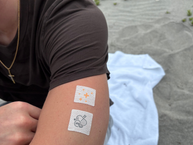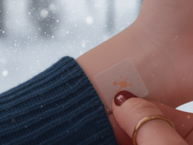You may hear a lot about biotin as a vitamin, but what is biotin and what are the benefits of biotin? It plays a role in metabolism. It’s also related to hair, skin, and nail health. Deficiency isn’t common, but can lead to a wealth of problems. Here’s what you should know about the benefits of biotin and side effects of biotin, and all about biotin patches.
What Is Biotin and What Does It Do?
Biotin is a B vitamin. It is often called vitamin B7. You might also hear about vitamin H or coenzyme R. Both of these also refer to biotin. But what is biotin?
Like many of the other B vitamins, biotin is a cofactor in many reactions in the body. It’s a necessary component in normal metabolism. You need biotin in the reactions that let your body break down carbohydrates, fats, and proteins from food and use them to generate energy. These are some of the nutrients whose metabolism requires biotin.
- Branched-chain amino acids (isoleucine, valine, and leucine)
- Glucose (from carbohydrates)
- Methionine (an amino acid from protein)
Biotin is also involved in other reactions, such as these.
- Regulation of genetic material
- Synthesis of cholesterol
- Synthesis of fat (lipogenesis)
- Synthesis of glucose (gluconeogenesis)
Some strains of bacteria, yeast, mold, and some plants can make biotin. Some of the bacteria in your gut can even make biotin. Still, they don’t make enough for your needs. You still need to get extra biotin from food or supplements.
Biotin Food Sources
There are many natural sources of biotin because all living organisms need it. It is in animal-source foods and plant-based foods. Liver and egg yolks have the most biotin. These foods also have biotin.
- Meat, such as pork, beef, and poultry.
- Fatty fish, such as salmon, tuna, sardines, and herring.
- Fruit, such as apples, strawberries, bananas, and orange juice.
- Vegetables, such as mushrooms, sweet potato, cauliflower, broccoli, and spinach.
- Whole grains, such as oatmeal and whole-grain cereal.
- Legumes, such as beans, split peas, lentils, and soybeans.
- Nuts, such as almonds, walnuts, and pecans.
- Peanuts and peanut butter.
- Dairy products, such as yogurt, milk, and cheese.
There are so many natural sources of biotin that many people with an adequate and varied diet do not worry about having a biotin deficiency. They may not see the benefits of biotin because they may never think about it.
Who Needs More Biotin?
It is not common for a severe biotin deficiency to occur in a healthy person who eats an otherwise adequate and varied diet. However, there are times when biotin may be lower. These are some people who may want to ask their healthcare providers about the benefits of biotin supplements.
- People on weight loss diets. Strict dieting can restrict food intake, leading to a lower overall intake of biotin.
- Bariatric surgery patients. It’s not just taking in less food that can lead to biotin deficiency. Bariatric surgery patients eat less, and may also eat a smaller variety of foods. It’s possible that they may miss out on some of the best sources of biotin.
- People who take certain types of medications. Medications for epilepsy or anti-seizure drugs, for example, can interfere with normal absorption of vitamins from food. Antibiotics are another class of medications that may
- People who have malabsorption disorders that interfere with nutrient absorption. Crohn’s disease and ulcerative colitis are examples.
- People born with a rare genetic disorder that leaves them without biotinidase. This is an enzyme that allows your body to reuse biotin. Instead of recycling biotin multiple times before discarding it, people with this disorder excrete biotin as waste after a single use.
- People who are on intravenous feeding.
- Pregnant women who are not getting enough nutrients to support themselves and their growing embryo.
- People who chronically drink too much alcohol.
If you have any of these conditions or any symptoms of biotin deficiency, it’s best to talk to your healthcare provider about what to do. Your doctor may order blood or urine tests related to levels of biotin in your body. These tests aren’t always completely accurate, though, so it’s a good idea to talk about related concerns, such as whether you are getting enough biotin from the diet.
Benefits of Biotin for Deficiency
The first benefit of biotin is that it can prevent symptoms of biotin deficiency, or reduce them if you already have them. These are some signs of biotin deficiency.
- Dry or brittle nails
- Rash on the skin, or dry skin
- Brittle hair or hair loss
- Reduced appetite
- Nausea
- Dry eyes
- Trouble sleeping
- Upset stomach or other gastrointestinal issues
If you have any of these signs or any health concerns, be sure to talk to your doctor!
Research on Health Benefits of Biotin
There’s some research on the benefits of biotin beyond preventing deficiency. Multiple sclerosis and diabetes are two of the chronic health conditions that have been investigated.
Multiple sclerosis (MS) is a progressive autoimmune disease. In clinical trials among patients with MS, participants on high doses of biotin have seen more improvements than participants in control groups.
Diabetes is a condition with high blood sugar. Because of biotin’s roles in glucose and fat metabolism, researchers have looked at whether biotin supplementation can improve blood sugar control. So far, there is some indication that biotin may help, but the results of studies are mixed and inconclusive.
Biotin for hair loss is a popular topic. That’s because hair loss can occur with biotin deficiency. Biotin is definitely needed to prevent hair loss that results from biotin deficiency. In addition, it’s critical to maintain adequate biotin after weight loss surgery, when hair loss is common.
Another hot topic is biotin for nails. It appears to help hoofed animals with abnormal hooves, and some research has looked at whether biotin can improve unhealthy fingernails. It appears that biotin may support normal nail thickness and strength in some people with thin nails or brittle nails.
Biotin and collagen are both needed for healthy skin, but they have different functions. Biotin is a cofactor in reactions. It allows them to go forward, but isn’t part of the final product. Collagen is a building block of certain tissues, such as skin.
Can You Take Too Much Biotin?
Does biotin cause acne? Does biotin cause weight gain? What are the side effects of too much biotin?
Biotin is a water-soluble vitamin and is relatively safe compared to some nutritional supplements. It’s not known to be toxic in high amounts the way fat-soluble vitamins can be. Unlike most nutrients, biotin does not have a tolerable upper level of intake (UL), which is the level above which a nutrient may cause health concerns.
Still, there can be side effects of too much biotin. You’ll want to be aware of a few possible effects.
- It can lead to incorrect values on vitamin D tests.
- It can lead to inaccurate values when testing for thyroid disease.
It’s also important to be aware that biotin can have an Interaction with vitamin B5. If you are taking high amounts of vitamin B5 (pantothenic acid), there can be competition for absorption. Also, biotin can interact with certain medications, so it’s always a good idea to discuss all of your medications with your healthcare provider when considering a biotin supplement.
Whenever taking a nutritional supplement, it’s important to talk to your healthcare provider first. You want to be sure to get the right dosing. You’ll also want to ask about which other nutrients you might want to take with biotin, as well as which form you want to use, such as a biotin patch.
Biotin Vitamin Patch
A vitamin patch may be your best bet for a big dose of biotin. Here are some reasons to choose a biotin patch instead of an oral supplement, such as capsules or chewable tablets.
- The PatchAid Biotin Plus Vitamin Patch for Hair, Skin, and Nails has 7.5 mg (7500 mcg) of biotin. That’s more than you may get in many oral supplements, such as capsules or chewable tablets.
- With a patch, there’s no competition with vitamin B5 (pantothenic acid) for uptake in the digestive tract. Instead, nutrients are absorbed transdermally (through the skin).
- You don’t have to think about whether you are taking your vitamins with or without food. It doesn’t matter when you apply your patch! Just take it off up to 8 hours later.
- You can be sure that a patch won’t cause digestive discomfort. When you’re not taking supplements by mouth, you won’t get related nausea, diarrhea, constipation, or other gastrointestinal symptoms caused by digestion and absorption.
The PatchAid Biotin Plus Vitamin Patch for Hair, Skin, and Nails also has related vitamins and minerals, as well as herbal ingredients.
- Antioxidants vitamins A, C, and E, and selenium
- Folic acid, a B vitamin
- Vitamin K and vitamin D
- Zinc
- There’s also a proprietary formula packed with antioxidants and building blocks for healthy cells, including collagen, cinnamon, curcumin, ginger, hoy basil, glucosamine, and more.
The PatchAid Biotin Plus Vitamin Patch for Hair, Skin, and Nails may*:
- Support normal nails, skin, and hair.
- Support normal metabolism.
- Promote heart health.
- Support bone and joint health.
*The Food and Drug Administration has not evaluated these statements. The Biotin Plus Vitamin Patch for Hair, Skin, and Nails by PatchAid is not intended to diagnose, treat, cure or prevent any disease. Anyone with a medical condition should seek the advice of a licensed medical practitioner. Individual results may vary.
You can also find the PatchAid Biotin Plus Vitamin Patch for Hair, Skin, and Nails in some patch packs.
As long as your healthcare provider agrees, PatchAid Vitamin Patches are designed to be safe for using multiple patches at once. That means you can use the PatchAid Biotin Plus Vitamin Patch for Hair, Skin, and Nails with other patches to support your nutritional and health needs and goals.
How to Use Biotin Patches
It’s easy to use biotin patches.
- Select an area of skin. The vitamin patch will stick better if you choose an area of skin without hair, lotion, or oil residues such as your shoulder, back, or hip. Clean and dry the skin.
- Remove the vitamin patch from the release liner.
- Adhere the vitamin patch to your skin, pressing firmly.
- For best results, it is recommended to wear PatchAid vitamin patches for 8 hours. There is no additional benefit wearing the vitamin patch longer than 8 hours.
- When finished, remove the vitamin patch, fold it in half, and discard.
- Repeat with a new vitamin patch the next day.
The Biotin Plus Vitamin Patch for Hair, Skin, and Nails by PatchAid is available in a skin-colored or clear version, so it’s discrete. It’s also easy to use because the backing peels off easily without making you feel like the patch is going to rip!
Benefits of biotin can add up if you are deficient in it or have risk factors for deficiency. The Biotin Plus Vitamin Patch for Hair, Skin, and Nails by PatchAid is an easy choice as it is very high in biotin, and contains supporting and related nutrients and other ingredients. It is easy to use.







